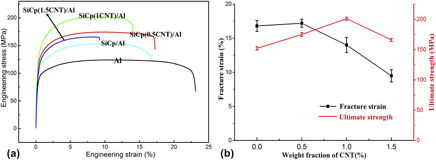Crossref Citations
This article has been cited by the following publications. This list is generated based on data provided by
Crossref.
Ding, Chao
Shi, Hailong
Wu, Kun
Wang, Xiaojun
Gan, Weimin
Hu, Xiaoshi
and
Xu, Chao
2020.
Processing, microstructure and mechanical properties of a novel mg matrix composites reinforced with urchin-like CNTs@SiCp.
Diamond and Related Materials,
Vol. 109,
Issue. ,
p.
108087.
Zhang, Zhiming
Fan, Genlian
Tan, Zhanqiu
Zhao, Haitao
Xu, Yanjin
Xiong, Dingbang
and
Li, Zhiqiang
2021.
Bioinspired multiscale Al2O3-rGO/Al laminated composites with superior mechanical properties.
Composites Part B: Engineering,
Vol. 217,
Issue. ,
p.
108916.
Zhang, Zhiming
Fan, Genlian
Tan, Zhanqiu
Zhao, Haitao
Xu, Yanjin
Xiong, Dingbang
and
Li, Zhiqiang
2021.
Towards the strength-ductility synergy of Al2O3/Al composite through the design of roughened interface.
Composites Part B: Engineering,
Vol. 224,
Issue. ,
p.
109251.
Gao, Mian
Shen, Zhitao
Yue, Gentian
Dong, Chen
Wu, Jihuai
Gao, Yueyue
and
Tan, Furui
2022.
Synergistic Effects of In4sns8@Mos2@Cnts on Electrode Interface Catalysis and Charge Transfer in Efficient Dye-Sensitized Solar Cells.
SSRN Electronic Journal ,
Van Trinh, Pham
Lee, Junho
Kang, Byungchul
Minh, Phan Ngoc
Phuong, Doan Dinh
and
Hong, Soon Hyung
2022.
Mechanical and wear properties of SiCp/CNT/Al6061 hybrid metal matrix composites.
Diamond and Related Materials,
Vol. 124,
Issue. ,
p.
108952.
Wang, Xiaoshu
Su, Yishi
Qiu, Caihao
Zhu, Chengnan
Wang, Xiaozhen
Cao, He
Zhang, Di
and
Ouyang, Qiubao
2022.
Mechanical behavior and interfacial micro-zones of SiCp(CNT) hybrid reinforced aluminum matrix composites.
Materials Characterization,
Vol. 189,
Issue. ,
p.
111982.
He, Ye
Shen, Zhitao
Yue, Gentian
Gao, Yueyue
Huo, Jinghao
Dong, Chen
Mao, Yangfan
and
Tan, Furui
2022.
A dye-sensitized solar cells with enhanced efficiency based on a “pillared effect” of CoMoP2 @Mxene@CNTs composite counter electrode.
Journal of Alloys and Compounds,
Vol. 922,
Issue. ,
p.
166279.
Tu, Sisi
Wang, Qun
and
Ramachandran, Chidambaram Seshadri
2022.
Parametric investigation of in-situ synthesis of carbon nanotubes on Al2O3 powder by the rotary chemical vapor deposition method.
Ceramics International,
Vol. 48,
Issue. 19,
p.
28258.
Gao, Mian
Shen, Zhitao
Yue, Gentian
Dong, Chen
Wu, Jihuai
Gao, Yueyue
and
Tan, Furui
2023.
One-pot hydrothermal in situ growth of In4SnS8@MoS2@CNTs as efficient Pt-free counter electrodes for dye-sensitized solar cells.
Journal of Alloys and Compounds,
Vol. 932,
Issue. ,
p.
167643.
Ravoor, Jishita
Selvam, Renold Elsen
Karuppan, Deepan
and
Puthillam, Umanath
2023.
Development of robocasted MWCNTS-calcium silicate 3D structures for bone regeneration applications with retention of MWCNTS using vacuum sintering technique.
Journal of Materials Research,
Vol. 38,
Issue. 9,
p.
2389.
Peng, Yahui
Zhao, Haitao
Ye, Jinrui
Yuan, Mingqing
Tian, Li
Li, Zhiqiang
Liu, Yang
and
Chen, Ji'an
2023.
3D multiscale tri-level finite element analysis of aluminum matrix composites with Nano&Micro hybrid inclusions.
Composite Structures,
Vol. 305,
Issue. ,
p.
116545.
Yue, Youcheng
Zhou, Lei
Li, Mengnie
Xu, Fushun
and
Cai, Xiaolan
2023.
Research Progress on Microstructure Design of CNTs Reinforced Al Matrix Composites.
Integrated Ferroelectrics,
Vol. 234,
Issue. 1,
p.
22.
Wei, Lin
Liu, GuiLi
Qian, ShaoRan
Zhao, JingWei
Jiao, Gan
and
Zhang, GuoYing
2024.
Molecular dynamics study of the mechanical properties of hydrated calcium silicate enhanced by functionalized carbon nanotubes.
Journal of Molecular Modeling,
Vol. 30,
Issue. 2,
CHEN, Yu-yao
NIE, Jin-feng
FAN, Yong
GU, Lei
XIE, Ke-wei
LIU, Xiang-fa
and
ZHAO, Yong-hao
2024.
Enhancing strength–ductility synergy of AlNp/Al composite by regulating heterostructure of matrix grain and particle distribution.
Transactions of Nonferrous Metals Society of China,
Vol. 34,
Issue. 4,
p.
1049.
Divakar, Sanoj
Sardar, Santanu
Sah, Satesh
and
Das, Debdulal
2025.
A state-of-the-art review on SiC and MWCNTs reinforced hybrid metal matrix composites: Processing, properties, and applications.
Hybrid Advances,
Vol. 10,
Issue. ,
p.
100454.
